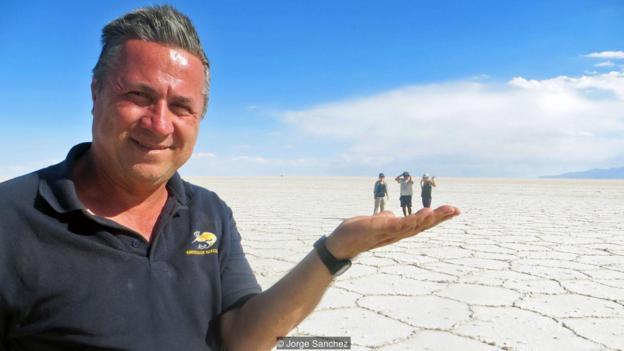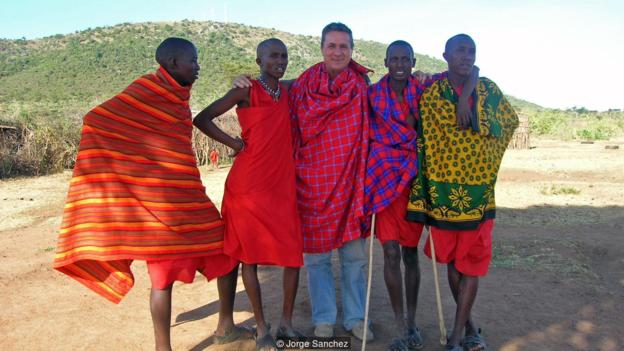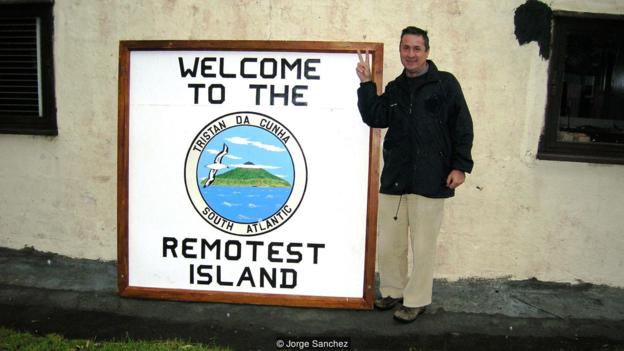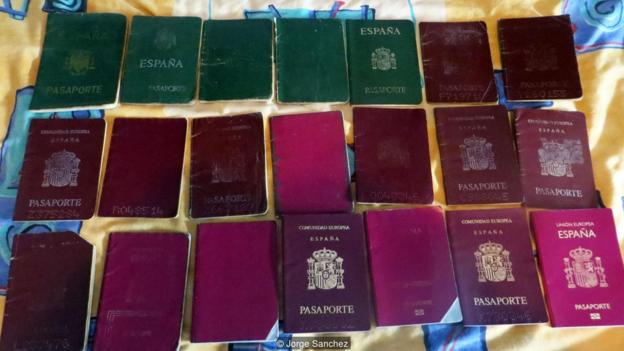Although he’s ranked the world’s #2 on The Best Traveled website, 62-year-old Barcelona native Jorge Sanchez insists that he is nothing like the other competitive travellers. He comes from a poor background, dropped out of school at 13, and has been on the move ever since, working sporadically in low-paying jobs on farms in Australia, New York restaurants, gold mines in Peru and dozens of other places. But despite all that, he’s managed to travel to all 193 countries recognized by the United Nations, and to every region of most of the world’s countries.
He’s done this by using his charm and ingenuity, and relying on the kindness of strangers. He has slept under bridges in India, in telephone booths in China, up a tree in Brazil, inside a morgue in Liechtenstein, in prisons in Colombia, Paraguay, Georgia and Afghanistan – where he was mistaken for a spy – and as a pilgrim in houses of worship representing every major world religion.

Sanchez’s philosophy is simple. He sees travel as a pilgrimage, a quest for knowledge and learning. He says that if one wants to understand the world, one must see it. But he also believes that every great traveller must also know when it is time to go home.
Q: You ran away from home at 13, leaving a note for your parents that you were off to Western Sahara?
Yes, I left home when I was 13 and caught a boat from Barcelona to Mallorca. By the time I arrived in the Canary Islands, I was 14. My father worked for the gas and electricity company; we had no car. They were poor. I looked at my dad’s atlas at night and I knew that I wanted to explore the world. I just escaped. I knew my parents would be very upset. I left them a message on the table, I told them I’m going and would come back.
In those times the Spanish Legion accepted minors as volunteers in Western Sahara. This was 1968, when it was still a Spanish colony. I joined the Legion, but I spent only a couple of days with the legionnaires because I didn’t like it, and anyway, my intention was to travel to Mauritania.
I became a legionnaire just so I could travel. But when I wasn’t allowed to enter Mauritania without a passport, I immediately left the Legion. I promised my parents that I wouldn’t do that again.
Once I got my passport at 18, I hitchhiked across 11 European countries, taking any kind of job in Paris, London, the Isle of Wight, Geneva and other places to earn money to survive. My goal was to learn languages and the art of travel. After two years of vagabonding in Europe, I had to return to Spain to join the army, which was compulsory during the Franco era.
Q: You’ve worked as a dishwasher, a carpenter and many other odd jobs. Are you working now?
Jobs for me have been a means to earn money to keep travelling. I have worked in a dental laboratory in Paris; sold cheese in the markets of Italy; played chess for money in The Philippines and Indonesia; worked with a group of gold miners in the Madre de Dios region in the Peruvian jungle. I was a busboy in a Puerto Rican restaurant in Greenwich Village, in New York City, and [did] many other jobs.
I have done any job imaginable, but I have no real profession. I’ve done the most ordinary and low-paid jobs. At the moment, I work for hotels in the Spanish province of Girona once a week, picking up passengers at the Barcelona airport.
Q: You mentioned that you had spent at least one night in every country save Liechtenstein and Tajikistan. You went back to Liechtenstein, but the hotels were too expensive so you slept rough. Can you tell us some more unusual places where you have slept?
In fact, that place in Liechtenstein was a morgue, but I didn’t know that when I went to sleep there. At 5 am, a hearse arrived. It woke me up when the driver and a helper opened the door near where I was sleeping on the ground. After a few minutes they returned to the hearse carrying a black coffin. When I saw that, I couldn’t sleep anymore and walked around the streets in the rain until it got light.
I once slept in a tree in Florianopolis, in the Brazilian state of Santa Catarina, for fear of bandits because I had no money to sleep in a hostel. I have also slept under bridges several times, mainly in India. I slept inside a telephone booth in Chengdu in China.

In 1986, I asked for help in a jail in Ipiales, at the border between Colombia and Ecuador, because there were many rascals following me with sinister intentions. The porters allowed me to spend a night in a cell with several criminals, but they were harmless and didn’t rob or attack me.
I have also slept for free in many religious places: Hindu temples in India; Sikh gurdwaras in Uganda and Tanzania; Muslim tekkes in Uzbekistan; Catholic churches in both Congos (DRC and ROC); Buddhist pagodas in Japan and Bangladesh; and Hebrew synagogues in Israel and Brazil.
I think that a real traveller has to spend at least 24 hours in every one of the 193 countries of the United Nations. I have slept in 192 of them now, only missing Tajikistan, which is why I will travel again to that country in the future.
Q: You’ve seen the world while spending very little money. Do you hope people will read your story and be inspired to travel, even if they are poor?
I hope so. In fact, when you calculate the money that you will spend travelling, you have to deduct the money that you would spend remaining at home. For some people, travelling and living several months in low-cost countries such as India, Indonesia, The Philippines, Bolivia, Peru, Morocco or Mozambique is even cheaper than staying at home.
For some people, travelling and living several months in low-cost countries is even cheaper than staying at home.
I never go to expensive hotels. I stay in hostels, dormitories, pensions. I always visit the local markets to eat. I hitchhike or travel by bus or train during the night to save the cost of a hotel, and to gain time. You can work in many countries, teaching languages or on farms in Australia and New Zealand.
Q: You told me that it is better to travel when you are young then when you retire. Do you advise people to save for their retirement or to travel as much as they like and worry about money later on?
I think everyone must find their own way. The worst thing to do is to spend your life doing something you have no passion for. Some people prefer to work all their life and to save money until they retire, and in between to travel once or twice a year during their holidays, like a tourist. Then at 60 they start travelling intensively, frantically even, as if trying to recover the lost time.
I have spent a total of 30 years on the road, and now that I am 62, I have no more money and no way to earn it. It is like the fable of the grasshopper who spent the winter months singing and the ant who worked to store food for the winter. I am the grasshopper. I do not regret anything, I am happy with the life that I have chosen, so now I have to face the consequences.
Q: Some travellers try to visit every place on Earth but you’ve said you’ll only go to places where there is something to learn. So what places are left on your to-do list?
Yes, it is true. Travel is a university and I’m still learning. One of the places that I would like to visit is Agalega Island in Mauritius. Along with Tristan da Cunha, Pitcairn and Tokelau, this is one of the most difficult (inhabited) islands in the world to reach, because they have no airports and the ferry service is so infrequent. I have tried to travel there twice; there is a regular boat that departs from Mauritius Island every six months. But both times the boat was fully booked with locals, who have [priority]. Another one is the Trobriand Islands in Papua New Guinea because I would like to study its matriarchal social system.

Q: Years ago, your first wife gave you an ultimatum to settle down but you couldn’t do it. Do you think if one is born to be a nomad there is no way to settle down and still be happy?
I wasn’t mature enough when my first wife gave me that ultimatum. I didn’t feel complete yet. I needed more knowledge to fulfil myself, and I sensed that I could only attain my goal through travel. Today, I understand that there are more important things apart from travelling in a man’s life. Now I realize that the real thing is the family. But to understand that, first I had to travel the world and to complete seven around-the-world journeys.
Travels are an instrument of learning, a way of life during your younger years, but there are superior goals in life. One has to know when it is the moment to say, “Travel has been very useful to me, but I don’t need it anymore.â€
Q: Can you impart any tips for people who want to see the world but think they don’t have enough money?
If the desire to travel is strong, those people must travel; otherwise, they will feel dead in life. The most important thing isn’t to travel or not to travel, but to find your own way. If you are sure that travelling is your destiny, you have to follow it. It doesn’t matter if you don’t have money; you can work – something along the way will happen that will help you. It’s always like this.
If you are sure that travelling is your destiny, you have to follow it.
Hitchhiking is the cheapest way to travel. There are still many countries where drivers pick up hitchhikers. I was just in South America and I hitchhiked with success in Brazil, in the state of Amapá; Bolivia, on the Road of Death; and crossing the Chaco region in Paraguay. I hitchhiked not necessarily to save money but because there was very limited public bus service.
I don’t go to restaurants. I don’t drink [alcohol]; I prefer juice. You fly in the low season, you use charter flights. I stay in dormitories for about $5 per night. And often times, I just sleep outside, especially in expensive countries. The waiting rooms of hospitals, you can sleep there, or in train stations. Sometimes I go to the Salvation Army. I make friends and they invite me to stay with them.
And I live like a monk here in Barcelona to save for travel. I can live on about 10 euros per day to survive. If I need a shower, I go to the railway station or bus station. For 5,000 euros, I could do a round-the-world trip of about six months.
Q: What have been some of your most important journeys?
The two years I spent vagabonding around Europe showed me that my destiny was to get to know the whole world. And, as compensation for not attending university, I took every continent as a subject, and every country as a lesson.
Also, my first around-the-word-journey, from 1982 to1984, lasted exactly 1,001 days visiting 46 countries. Walking the Camino de Santiago from Saint Jean Pied de Port in France to Santiago de Compostela in Spain in 2003, the same year I visited my last UN country, Somalia, was also an important inner journey. I also did all the alternate Caminos: the French Way, the Original Way, Â the Mozarabe, the Portuguese Wayand the Northern Way.
I made my seventh and final round-the-world journey earlier this year. I wanted to be like Sinbad the Sailor and make seven journeys like him because I read this book as a boy.
Q: Have you had many problems on the road?
I was robbed in Johannesburg, but I still like South Africa. I crossed the border into Afghanistan from Pakistan with no visa in 1989, after the Russians left, and I was jailed for four months in Kabul as a suspected spy. It was kind of like living for free. I was also jailed in Georgia for three days in 2007 after crossing the border from Abkhazia [a breakaway region]. I had to pay a fine of 2,000 euros.
Q: What are your travel plans for 2017?
I’d like to visit Tajikistan and see the Gorno-Badakhshan autonomous region, which someday could be an independent country. Tajikistan is the only UN country I’ve been to where I did not spend the night, so I want to go back and see more.
And I would perhaps like to take a boat up the Yenisei River in Russia to observe the way of life of the Evenki people. When my son, Lázaro, who is now one, [is] about five or six years old, I would like to travel with him and my wife so he can acquire knowledge to understand life on our planet, and the people living in it, and to develop his soul.
Q: Do you think it’s necessary to travel to all these places in order to learn about them or could you have simply read books about them?
You cannot learn to swim by reading a book; you need to throw yourself into the sea or into a swimming pool for that. The same happens if you want to practice yoga; reading books about yoga is useless to achieve a real yoga experience. If you want to know the world you must travel the world.
By Dave Seminara







